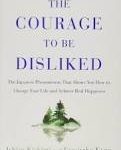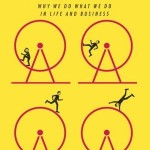Here is a full listing of the books on my bookshelf that I lend out as part of my coaching. I make it a habit to loan books from my collection to address specific issues in the workplace.
Mind Tools for Managers by Manktelow and Birkinshaw
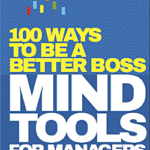
I still remember the day when I came to work in my first managerial job as Chief Psychologist in large university-based health sciences center in Montreal. Youthfully naïve and thinking that the position was some celestially guided reward for being an effective and hard working clinical psychologist, I was woefully unprepared for what awaited me.
I was unprepared to integrate a disparate staff of varying therapy orientations, values and aspirations for the department. I was equally unprepared to deal with my own administrators who wanted more productivity from the department whose members expected me to shield them from those same management philistines that valued rapid therapy turnover rather than good therapeutic alliances.
I caught myself that first day hoping that the phone would ring with someone telling me how to deal with all these challenges, and maybe provide some helpful hints as to how I might actually accomplish some of my own leadership goals.
I wouldn’t have needed that phone call if Mind Tools for Managers had been written in 1980. In fact, if I could recommend just one book for anyone transitioning into a leadership role it would be Manktelow’s and Birkinshaw’s comprehensive review of everything every manager needs to know.
Their review covers personal advice on managing your own stress, managing teams and motivating the people in them. It reviews most major principles in positive psychology, cognitive behavior therapy, HR principles and I/O psychology that touch upon the world of work. Each principle, and there are far more than a hundred, is clearly described in ways that make its application to management straightforward. The book also provides extensive references mostly to web-based links for the reader searching for more information or background.
The book is not only a great review for all seasoned managers but also a requirement for new ones.
Good Boss: Bad Boss by Robert Sutton

At a recent California psychology conference, I found myself in a long line of post-talk attendees hoping to speak to the renowned speaker, and former professor of mine, Dr Don Meichenbaum.
Some forty years ago, I was lucky enough to be in a small group of doctoral students in Clinical Psychology at the University of Waterloo that managed to hire leading psychologists of the day. Forty years later, I remember the excitement and passion that Don generated in his seminars with his paradigm breaking work on the importance of self-talk in his new of 1974 treatment approach, cognitive behavior therapy.
In my own teaching at McGill, I quote Dr. Meichenbaum frequently. Therefore, it was somewhat of a shock when I got to the front of the line to see Don’s eyes first scan my face, then quickly my nametag and then back to my face without showing any sign of obvious recognition. After several awkward phrases, break-through recognition was achieved, or at least satisfactorily feigned. As I left the hall in a somewhat sober mood, two young people approached me with enthusiastic “Hello Dr Bradley, good to see you here” comments. I drew a blank. After giving countless undergraduate and graduate courses, I had no idea whom I was talking to.
All this came together when I read Professor Sutton’s latest book: “Good Boss, Bad Boss” that in my opinion is a must-read for any of the twenty-one million North Americans who call themself a boss. The book is chuck-full of helpful hints about managing people, work and time. It’s a crucial read since bad bosses, the topic of Sutton’s first book, are abundant. In fact, apparently 27% of workers would fire their current one if they had the power. But instead of hammering away at the damage caused by lousy bosses, Sutton stresses the benefits of balancing compassion with results, of creating a psychologically safe working space where creativity flourishes and when required, apologies are given.
And, to tie in to my convention story, here’s what Sutton says about just one of many helpful tips to be a good a boss, leader or teacher:
“ If you get up form your desk people watch to see where you are going, someone always knows when you are in the bathroom. They watch your face when the VP of production leaves your office and make a guess about the meaning of your expression. They watch to see if you smile more at Sally than you do at Tom, and make guesses about what that means too. They learn to read your “tells’ –the way you drum your fingers when you are impatient or the eyebrow you raise just before you cut off someone’s explanation You are constantly on your team’s radar. They see and hear everything that you do.”
But here’s the rub: Some bosses or people at the top become oblivious to this public regard. Due to excessive hubris or self-centeredness, they carelessly talk in front of secretaries, talk about patients or employees in corridors where others can hear, etc. Most importantly, they fail at being great models. If you’re a boss, know that you’re always on-stage even to an audience of people you might not know or remember.
The Asshole Survival Guide by Robert Sutton
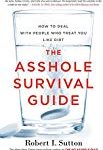
The catchy title perhaps belies the academic credentials behind the scholarly author of this very quotable book on coping with demeaning or critical bosses. Robert Sutton is a professor of Management Studies at Stanford and an author of numerous books on management, organizations and business psychology. Although not his latest book, The Asshole Survival Guide is a book that I recommend to many of my coaching clients beleaguered by bosses who shouldn’t be bosses.
The eye-popping research illustrating the nefarious effect of demeaning, critical or abusive management on health, creativity and even bottom-line performance of the subordinate workers and their organizations grabs the reader’s attention from the beginning. Thankfully, Sutton moves on to providing the rationale and specifics of numerous coping techniques from distancing oneself, fighting back, cognitive reappraisal and even revenge. Be careful about the later, since revenge often produces longer term negative rumination in the perpetrator than in the target.
If you’re depressed from negative interactions with your boss, or helping people who are, this is the book for you or them
The Courage Solution by Mindy Mackenzie

I must admit that I had some serious doubts about this thin book with its all-too catchy title. As a university professor who believes in empirically justified everything, my doubts were fueled by the author’s introduction proudly proclaiming that the books reflects a “non-theoretical or non-research based perspective.”
Boy, was my initial judgment wrong. In fact, if I had to recommend one, and only one, book for young people starting their corporate careers, this would it.
Mindy Mackenzie condenses her wealth of business and leadership experience into easy to read and remember key points that HR’s orientation will never discuss. Career building keys such as getting a good read on your boss, knowing how your company makes money as well as recognizing your strengths and weaknesses are only some of the relevant themes tackled.
Along the way, Mackenzie lays out a buffet-spread of handy interpersonal axioms to deal with tough situations such as delivering critical feedback, disagreeing with your boss and developing wide social networks. Although I stressed how valuable this book could be to young workers, those seeking to better their relationships with their own boss – that covers almost everyone- can also benefit from the many helpful and practical tips offered in this excellent book.
Executive Toughness: The Mental-Training Program to Increase Your Leadership Performance
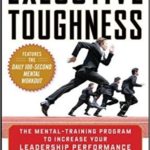
Jason Selk
There is a considerable literature on goal attainment with multiple books providing tips on how to stay focused, measure progress and even celebrate achievement. I will not provide the reader with yet another creative decoding of the SMART acronym. However, in Executive Toughness not much text is devoted to these concepts.
I thought of this paradox, as I read Jason Selk’s book on executive toughness and remembered my first day on the job some thirty years ago as the newly installed Chief Psychologist of a major hospital in Montreal. I remember being struck by the enormity and barrenness of my new office that contained nothing offer than a large desk with a solitary phone. Although I had passed a rigorous selection process to get this job, I really had no clue about what a chief psychologist actually did.
I secretly hoped that that phone would on day ring and someone would tell me what to do.
Here’s what Selk says about that process:
“… most of us spend our life waiting; waiting for the next big idea; waiting for a promotion, the next reorg, never realizing the importance of deciding what it is we need to do ourselves to achieve our goals… we must define your own win.”
Besides helping me establish my own goals, I could have benefited from Selk’s book because after defining my goals I would have formally written them down and reviewed my progress to their attainment on a regular basis- activities that are major determinants of goal success. Along the way, I would have also learned about the importance of defining process versus outcome goals since both are necessary for success. Knowing what you want without knowing how to get there, doesn’t really help that much.
Recognizing that the first step is always the hardest, Selk counsels readers to begin with an intermediate goal. If you want to make ten cold calls today then start with a goal of three and then let the resulting momentum carry you forward to the last seven.
I’m not sure that this book will make executives emotionally tougher, but if toughness flows from successful accomplishments, then this book is a great start.
It deserves a spot on your bookshelf.
The Life Changing Magic of Tidying Up by Marie Kondo

To reduce visual stress read this simple and motivating tidying-up book with its many helpful hints such as 1) clean-up everything at once, 2) get rid of items that don’t bring pleasure and 3) ensure that every item has a particular storage place.
Happiness Advantage by Shawn Archor
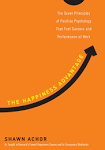
This is a great book on so many fronts not the least of which involves goal-setting; here are some of Shawn’s tips:
#1 Start with a positive frame of mind
#2 Note all the resources at your disposition
#3 List all the possible routes to achieve that goal
#4 Since effort is dramatically increased as you approach the goal, start subjectively closer to your goal. Shorten your time perspective, what do you want to do in the next week
#5 Decrease the sense of competition see yourself at the top of a small pool than the middle of large one
#6 Stay focused on the goal and recognize the signal.
How of Happiness by Dr Sonya Lyubomirsky

I’m always suspicious about psychology books that prescribe the path of happiness. What do we know about happiness more than writers, philosophers or even bartenders. Turns out, a lot, and all of what UC Riverside psychology professor, Dr. Sonja Lyubomirsky, in her book endorses is backed by strong experimental evidence. It really does work, she can prove it in this book that scans every from achievement to zootherapy.
What’s in it for the psychology of work, well lots starting from a definition of happiness as something based on activity – “t’s a running stream not a stagnant pool.” Whole sections are devoted to making our work life more satisfying including how to move on from mistakes, not getting catch-up in self-defeating comparisons, and staying focused but being open to new experiences.

